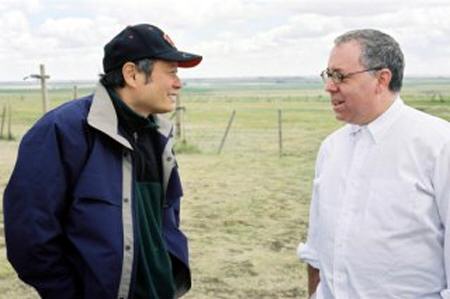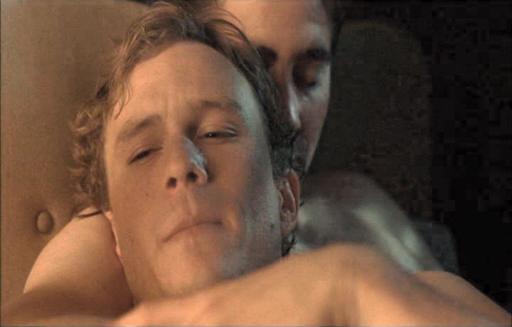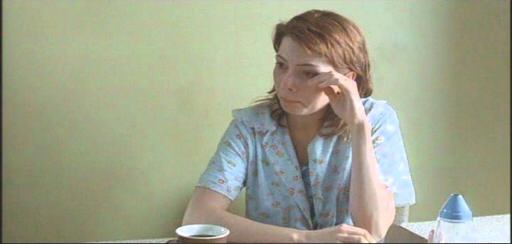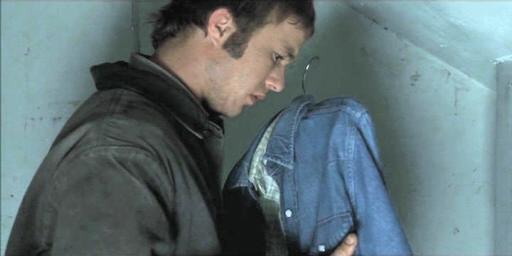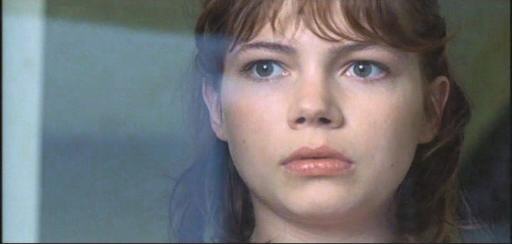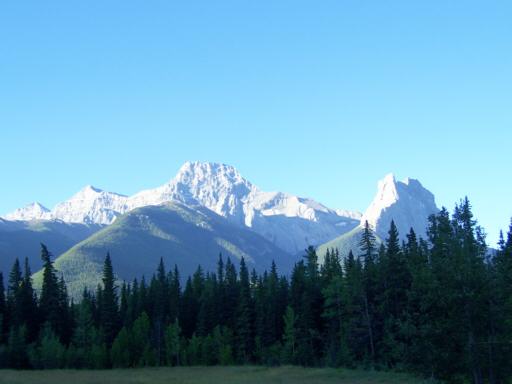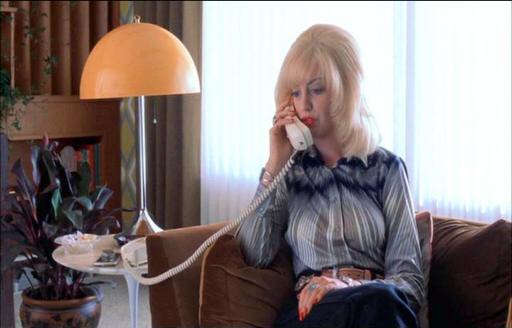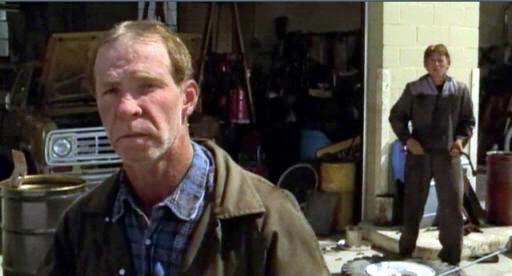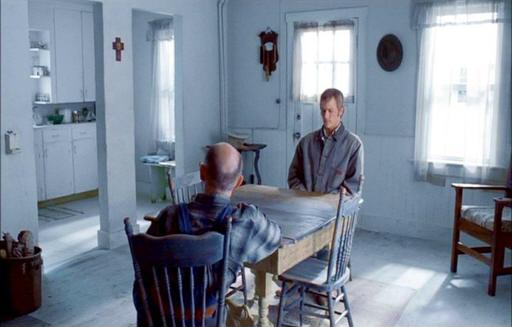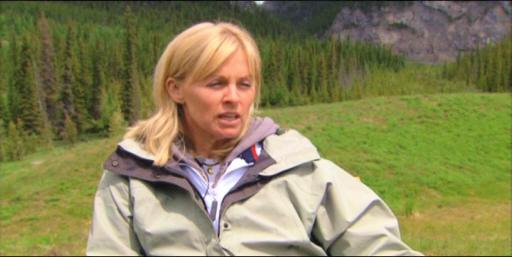But that’s why it looks so pristine, too. Sure, yeah. So the film’s finished and then you had, I’m sure, a rather interesting discussion about how to market this thing. What was that like? Well, we didn’t have that until we had a couple of passes at the movie, so... Okay, well, talk about that. Were there scenes changed or moved around? There are some scenes that aren’t in the film, but...the first cut was rough. I mean, we lost our first editor [Geraldine Peroni] the day the filming wrapped. She died. And we had to bring in a new editor [Dylan Tichenor] and bring him up to speed, and we had to do it quickly. And even though James was the head of the studio, it was very hard on us. About three days before we wrapped, Ang came up to me and he said, “This isn’t a ‘low budget’ film, this is a ‘no budget’ film. I want two days of second unit; I can’t have it.” He was upset, we were both upset, but you just have to do what you can. We did the first pass; Larry didn’t see that one, I did. We gave notes. Michael and I gave notes and about 80% of them were addressed on the second pass, and that’s when I took Larry, and that’s when we knew we had something great. It was so funny because, when Larry came...Larry is such an odd fellow. He’s very humble and unassuming, and he doesn’t grasp the weight his words carry when he speaks, so he just says what he thinks, very direct. That’s a little scary in Hollywood. So when we all went to the screening of the second cut, we got there and nobody said anything; they were very nervous. And Larry was just himself. He sat down by himself sort of in the middle of the theater and I sat way over on one side. We saw the film and the lights came on, and I looked over at him and there were tears coming down this man’s face. I’ve only seen him cry two times in 22 years. The first time was when his son called to tell him he was getting divorced, and that day. That’s it. That’s all. So we knew we had something special. We had a meeting afterwards, we were all talking, and we would have been thrilled if five people came to see the movie, we were so happy with it. But James said something like, “Well, who’s our audience?” And Ang said, “Gay people.” And James said, “No, women. Yeah, that’s how you get the men in there, too. The wives and girlfriends, they drag ‘em in there.” And that was pretty much it, and that’s kind of how that all started. 15
I’m going to open up for questions [from the audience]. Audience: In terms of Ang with his schedule, does he like shooting in the morning, like early, six o’clock, or is he an afternoon person? You don’t have that luxury. When you’re making a film you have just so much time; sometimes you have to make daylight in the middle of the night. We had 12- and 16-hour shooting days, and we were shooting seven days a week. We just didn’t stop. And everybody was into that? Well, they did it. They didn’t have any choice. You either did it or you left. Audience: [This person said thank you, that he had seen the film 16 times on the big screen, and that this viewing was just as powerful as the first time he saw it.] Well, you’re welcome. Thank you for seeing it. I couldn’t watch it. I had to leave. Right now it’s still too fresh; and it’s so powerful. When I saw it for the first time with everything done, the music and everything, because, you know, you did it in pieces, and we picked out the music, and had the songs and all of this. And before Larry and I sort of went out into the world to talk about it we saw it on a big screen in Tucson, and I invited all my friends and some family. I invited this wide cross-section of people because we wanted to know what they all thought and felt, what it did for them, you know? And the responses were amazing. They were fun, too, but I just remember how it affected me, and it still does. 16 Audience: That’s what I was wondering about, if you see things in it now, after you haven’t seen it for a little while, that are new for you. No. I’ve lived with it for so long, and I was there for every scene that was shot. I was on the set the whole time, and I talked to the actors about things, and the wardrobe people, and the wranglers—had to wrangle them. So, no, I know the script by heart and all of that. There’s no surprises there for me. Audience: I was wondering how much direct input you got during the process of the writing, or filming, probably not the writing, from people who are gay. I find it kind of miraculous that Annie got it as right as she got it. Not because I think she didn’t know gay people, but because she captured an experience... All the men from that period I’ve ever talked to, the first thing they say is, “She got it so right.” I was really wondering whether, during the process, there was direct input... No. The best way I can respond to that is, as a writer...Larry’s a good example because Larry writes incredible women, and how does he understand? He’s a man, he’s never been a woman, and yet when he writes he gets in their heads so clearly. And honest to God, he’s as clueless as the next guy in real life, but when he’s writing it’s a different experience. And as a writer myself, I just know that when I’m writing—and he described it recently, and he was right on when he said this—when you’re writing and you’re doing it, it’s almost trance-like. You’re in the story so deeply, and these characters become more real to you than the real people in your lives. I can remember, when I’d be writing a scene for the script, when my daughter would come talk to me and I didn’t even know she was in the room. That’s just kind of what happens. It’s a kind of knowing. It seems ultra-sensitive; I don’t know what it is. Maybe another writer could explain it better, I don’t know.
17 I’ve grown up observing people. I’ve always been an observer, much less of a participant. I’m not comfortable participating. I’m much more comfortable watching, and I’m very intuitive about people and things, and I’ve read an unbelievable amount of stuff, and I had gay friends growing up. I remember when I was a little girl; my mother pointed this out to me. I got my third grade report card, and I always made really good grades. I was a real nerd; I was quiet so I studied all the time. But she got the report card from my teacher and she talked to me about it; she was upset. She said that the teacher said that I got along really well with the other students, but I had this tendency to gravitate towards the lost children, the children that got made fun of or the ones that were sad, and that she felt this might not serve me well when I grew up. My mother said this to me and she said, “Now you know, you need to make better friends.” I didn’t know what the heck she was talking about because all I knew was I didn’t make fun of children, I didn’t have those kinds of feelings. Maybe I didn’t have a strong sense of irony as a child, but when other people would do that it would get me really angry, and I remember feeling that. The thing that I’m curious about that I’m always so struck by, and I think it comes across not only with Heath’s character but also with Michelle’s, there are moments where a lot has to be said by the actors, yet they don’t say anything. You mean where there’s no dialogue? Yes, exactly. So, were you concerned about that in the script, that what needed to be said was understood? Were there discussions about this as it was being shot? I thought about that a lot when we were writing this script. I used so much of Annie’s prose, her narrative, in the script itself because I felt like no matter who we cast in these parts they would be very young and they would have to be really fine actors, because that’s what acting is, when you’re seeing the emotion on the person’s face rather than it coming out of their mouths in the dialogue. So I felt like the script should be sort of a road map to where they were going in character, so that’s a lot of what was in the script. There was a lot of that sort of guiding in the script in the sense of the emotions and the things that were obvious on their faces. 18
For example, Michelle, on the first day shooting, injured her leg and wound up in the emergency room all day, and she was really nervous because she didn’t think she was going to be able to continue. And I said, “Don’t even think that. It’s not going to happen.” We were talking about her character—she [Michelle] was born in Montana—and she and Heath are very similar in the sense that they’re both instinctive actors, they’re very natural, they know exactly what to do. They just knew, whatever it was. Even though they had never had the experiences, they read it, they figured it out, and they just knew. The first day on the set with Heath—Jake came later; his part didn’t start for a couple of weeks—I had typed up this single page to give to the two boys, and all it was, essentially, was a lot of the discussion I had had with Annie and Larry over the years about these characters and their story, all of it sort of condensed, about who they were, and what their relationship was, and where it went, where it had gone, and what they were like as men. I typed this up single spaced from beginning to end and I gave it to Heath the first day and I said, “Listen, if you ever feel lost, if the day comes when you’re there on the set and you start to feel confused or lost about where you are or who you are, just read this and it will help you sort of find your way back.” So he took it, and a couple of weeks later he came back to me and he said, “Diana, would you print up one of those again? I had it in my jeans and washed it, and it disappeared.” And then, when Jake came, I did the same thing with him. Of course, they knew they were open to speak to us whenever they could, me or Larry or whoever, because I had a hot line to Larry with the cell phone. And then, the day that the boys did their kissing scene, they did such a great job, I had Larry on the phone and he wanted to talk to them, and they were so excited, and I let them talk to Larry on the phone, and he said, “Diana said you just were amazing” and they were like little kids; it was great. Was there a distinct difference in the way that Jake approached the material? Yes, they were very different. Every take Jake would vary it slightly, so Ang had a lot of choices. Heath, though, was very specific. When the cameras weren’t rolling, Heath was Heath. He was bubbly and funny, like a little boy, just jumping all over the place and making jokes. But as soon as “Action” he was just—it was eerie, it was instantaneous—he would just fall into character. 19 There was really only one scene that we shot where I could tell that it was very angst-filled for him, and that was the scene when he finds the shirts. For one thing, we filmed way into the middle of the night; it was playing night for day. We had lights everywhere. It was very, very emotional for him. He had to go someplace that it was very difficult for him to go. But all the other times, when the cameras weren’t rolling, he was just happy and funny and running around like a little kid.
In between takes, a lot of times, Jake would make jokes. He would sing show tunes and then he would do impersonations of old producers, and he was just a riot. All the crew would laugh and laugh. But they were very different. Heath was very—he was Ennis. When the cameras rolled, he was that character. And Jake was a little different. He would just give it shadings and different things. And even the boys in real life were in some ways similar to their characters. Heath wouldn’t talk a lot about himself, but he would engage other people all the time, and at one point he brought 14 of his grade-school buddies to the set. They visited for a week and they all had fun. Audience: How long did it take you, from 1997 until you finished the film? We finished filming in August of 2004. It really didn’t start to happen until the end of 2003. We had a very short pre-production and then we started shooting. It was 47 actual shooting days. Audience: I’m just interested in your method of working with Larry. What’s a typical day of writing with him, and how did you divvy up the job of writing the script? Oh, this script was very specific because it was a short story. We had never adapted a short story before. First we talked about it, what we thought it needed. And then we decided to go ahead and script what we had in the story first, write those scenes, and then we went back through and decided what we wanted to add. That was pretty much essentially how we did it, but we worked every day until we had that first draft. It was a little over three months. 20 Our methods are very different. He gets up first thing in the morning, he takes his bath, he takes his walk, and then he sits down and writes. On this script he wrote five pages a day. I would take his pages, put them in my computer, and either trash them, add on to them, you know, that kind of thing, and then I would print them out when I was done and give them to him that evening so he’d have them the next morning to start fresh from, his five pages. He’d stop in the middle of a sentence. He just stops. And he still does that, except now he writes 10 pages a day; never, never, never more. Audience: When Michelle sees them kissing, why did you make it so long before she chose to confront him? Do you mean why didn’t she confront him right away? [Yes] Oh, Michelle and I even talked about that. This is what I said to her; this is just my understanding of it. I told her that Alma is a very young woman, that her entire future, in her mind, had always been getting married, having children and settling down, and being a wife and a mother, and she was in her early 20s. She saw what she saw, but she may not have even been certain of what she was seeing, but she just knew that some geologic shift had taken place in her life. She may have heard about homosexuality, or not even been aware. Michelle and I talked about this back and forth. I said she may not have even heard the word, didn’t know. Maybe she had a hint of it. She was probably too embarrassed to ask her mother. She may have had to go to the library and get it figured out, but she sensed something was very amiss. And again, [sometimes] you don’t grasp things right away.
So, a lot of why she didn’t confront him immediately—what was she going to do? Where would she go? Her parents maybe lived in a trailer. Would they have room for her and her two girls? No. There was no such thing as welfare. What she did, essentially, from mine and Larry’s point of view, she found Monroe. 21 She found a man who loved her and would support her and the girls, somebody that would take care of her, so she shifted out of that. But another reason, and I think it’s made clear in the film if you looked at it again, you know, Ennis was a man with a short fuse, and it could be set off. He’s very angry. I think we sort of know why, but he didn’t know why, and I think he was very volatile, and she was afraid of him. She was just trying to feel her way, and she felt her way out of that relationship. It took her time, though. She had these babies, she was young, she was naive, she was learning about the world. Audience: What was Alberta’s part in the production? What was their participation in the film? Do you mean Alberta, Canada? Oh, that’s where we filmed the whole thing. We filmed up there because we could afford to film there. And it had the scenery. Oh, it’s an amazing place. It’s very raw. Ang was even surprised at how much some of it looked like Wyoming. So was Annie.
Audience: Do you ever have the feeling that this film has advanced the political dialogue in ways that you might not have expected when you wrote it? 22 I know that I’m the kind of person that doesn’t like being told what to think, or how to think. I just don’t like being preached to, but I also believe that this kind of a film, because of the way the world is, when you bring up something like this to people it becomes political on its own, without even trying. And what I said earlier about this film being about compassion, I think that that speaks volumes. I think seeing this movie was an educational experience for a lot of people, people who didn’t really think about the fact that gays feel the same way that straight people feel, that they have the same feelings, the same needs and the same emotions, love, hate, whatever, and they’re human beings, for God’s sake. This validated that. This acknowledged that, and I think that that was an education for a lot of people. It may have been uncomfortable, it may have been disturbing, but it was there none the less, and it’s something that, because it’s not hitting you over the head, it’s not polemic—it’s very realistic, and it’s very raw—it works it’s way into your psyche in a way that you kind of can’t control, which I love about it. That was the other thing, that was the power of that story. The story was very spare, but there was something in it, an undercurrent of something that I felt very strongly, and I sensed it very strongly, and it moved me, and I felt, This is important, there’s something important about this. But I couldn’t have even articulated it to anyone, I just knew it. I knew it here, instead of here. So whatever it’s done in that regard has been sort of like a bonus, it’s like icing on the cake. We tell you the story, you take from it what you need or want or whatever it is you take from it, and think about it and process it. Audience: I just have a small trivia question. There’s a difference between Annie’s novel and your story that centers around the name of the younger daughter, which you changed from Francine to Jenny. I’d like to hear the story behind that. Oh, it’s a simple story. They have to check on names, and if it belongs to a real person you have to get them cleared, so that’s why the names are changed. That’s the only reason, because we didn’t get clearance from the real people. Audience: On Oprah, Anne Hathaway said that she thought it was obvious whether her character knew what really happened, when she’s on the phone with Ennis near the end. Does she really know what happened to Jack? Well, I’m not sure any of us really know what happened to Jack. I mean, the way that we wrote it was that it would be ambiguous; that what we see when we see that flashback, when Ennis is talking to her, is what he [imagines]. This is his worst fear, after all. This is why they couldn’t be together. He was sort of brainwashed, when he was very young, into thinking that this is where they would end up. So when we see that scene in the film, this is what Ennis is imagining, his worst fear. Now, whatever Annie [Hathaway] said on Oprah at the time, and again, this was talked about...She asked me, “Did she love Jack?” I said to her, “As you’re getting older in this marriage...” and that’s why Ang had her do the big hair, the really blond, he wanted her to become extreme, because she got bitter and angry. She knew something was up with her husband, but when she’s talking to Ennis on the phone, whatever happened there, we talked about it then. I said, “Annie, you know, you’re not really certain, but you do know that this man, when you’re talking to him, you figure out very quickly that this was one of his lovers, this was somebody that he must have been with because, you know, the Brokeback Mountain thing, and he said, ‘We herded sheep.’ 23 And ‘he used to talk about it’ and ‘I just thought it was a pretend place.’” And she’s kind of angry, you can see it, and she’s also hurt. There’s all these complex emotions on her face. But when she said that on Oprah, I think that was just looking back when she said that, because at the time, shooting the scene, that’s not what was going through her head. There was a lot of, sort of, under ground stuff going on, you know, all these little awarenesses coming as she’s talking to this man on the phone.
Audience: Was it an accident? Well, it’s whatever you think. Larry and I would go back and forth about it. We would argue about it, too. [Diana mimicking Larry’s voice] “Oh, people got hit in the face with tire rims all the time, you know? It still happens.” I said, “I know.” But you never know. We used to go back and forth. When we talked to Ang about this we felt that it should be left that way. Now there’s a scene, I don’t know if you remember the trailer, there are these two guys, these mechanics. The studio wanted us to shoot the scene of [Jack] and Randall kind of like parting and these two guys watching them, in case the audience didn’t understand. And Larry and I are like, “What? That’s just silly.” But we shot the scene, and it was never even put in any of the cuts. 24
Two more questions before I have to wrap up. Diana, could you talk about that scene with Jack’s parents in that home, the way it looked? It looked like it stepped right out of the Great Depression and Dorothea Lang [2]. That was Judy. Judy Becker did that. That was amazing. I mean, it was so stark and so raw, and to Larry and myself, in the story and in the film, that’s where the great tragedy comes, is in that scene. This is something we talked to the boys about, too, and Heath, that night, when we filmed in that house. I mean, there were things, when you talk about somebody bringing something to the film... In the scene in the trailer at the end, it was Heath’s idea, of course, to change the shirts. When he finds them his is inside Jack’s, and at the end, Jack’s is inside his. That was Heath. He was so excited, like a little kid that day. “Wait ‘til you see what I’ve done; I’ve got a surprise for you.” But in the scene where he sees the mother, and he comes, and she gives him the bag and all that...yeah...that was really...that’s the clincher to me. [2] Dorothea Lange (May 25, 1895 – October 11, 1965) was an influential American documentary photographer and photojournalist, best known for her Depression-era work for the Farm Security Administration (FSA). 25
His environment is so stark... And you can see why he would want to leave there. Because Jack was a person with imagination, and he was a romantic. He saw life as possibilities. Sort of, in a way, like Don Quixote, Sancho Panza and the Don. Heath was the realist, and Jack was the dreamer. Okay, who’s got the last question? Audience: I wanted to ask you something about the DVD. Is there a reason why the commentary wasn’t done? There were a few featurettes on the DVD, and they were good as far as they went, but there could have been so much more. I just watched those for the first time about a month ago, and they were very sparse; I was surprised. They did a lengthy interview with me and Larry in addition, and there’s very little of that on there. I don’t know. I really have no answer for that. As for the other DVDs of Ang’s, I know Mr. Schamus and he worked together on a script and so forth, so maybe that’s why, because they would do it together or something, but that wasn’t the case here. I don’t know. I can’t explain that really. You’d have to talk to Focus about that. 26
You don’t need a DVD commentary; you got it right here. [Applause.] I definitely want you all to hear this. When you create something as a writer, or a filmmaker even—and Larry and I both feel this way—once it’s gone out into the world...I mean, I still feel a deep connection to this because...it’s very hard for me, because every day on the set...I have memories of things here that it brings out, that make me very sad, you know? Bittersweet. But this film, and that’s why I can still watch it and it moves me as if I’ve never seen it before, because it’s its own thing now, its own being, it’s its own creation. It lives on its own. It’s out in the world and it will keep making its way probably long after we’re gone, but it is what it is and I’m very proud of it. But even if you never talked to me or never heard a word from me, everything you need to know is up on that screen, it’s right there. 27 [Part 1 of this transcript is available here.] |
